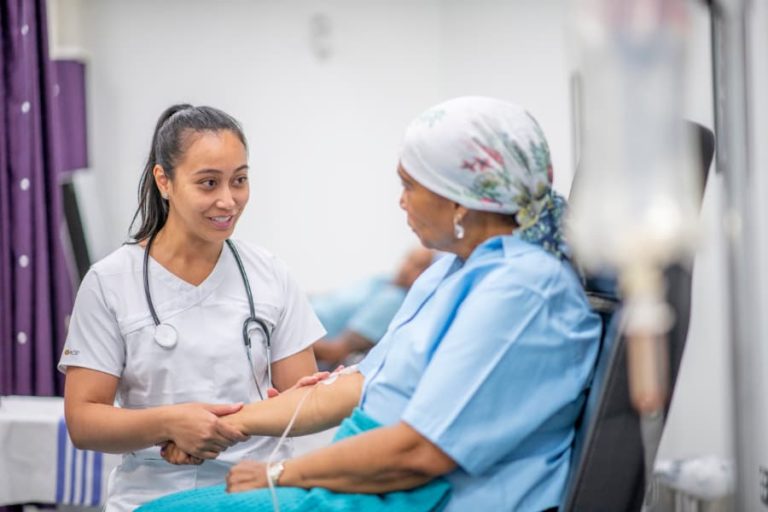
Targeting Treatments for Chronic Lymphocytic Leukemia
Dr. Joel Silver How do myeloma and chronic lymphocytic leukemia (CLL) develop? What are some risk factors associated with those malignancies? A. We don’t know
HIPAA Alert: Potential Data Breach Learn More
Questions on Oncology, Hematology and/or Infusion Clinical Services due to COVID-19 Crisis – CALL 833-698-1623
Important Information for Our Patients Regarding the Coronavirus.
RCCA Providing Area Cancer Patients with Access to Care During Coronavirus Outbreak
RCCA Offering Patients Virtual Visits During Coronavirus Pandemic
No two cases of leukemia are alike. Depending on an individual’s age, state of health, or concurrent conditions, he or she may have vastly different needs than other patients with a similar diagnosis. For that reason, the journey toward beating leukemia begins with individualized treatment.
Regional Cancer Care Associates offers residents of Connecticut, Maryland, and New Jersey the personalized, quality care they deserve in a convenient location. Our expert oncologists work with each patient to choose from a range of leukemia treatment options, including …
Chemotherapy, or “chemo,” is one of the most common and well-known forms of cancer treatment. The term refers to a set of powerful drugs that poison and destroy leukemia cells, just as antibiotics target and kill bacteria. Chemotherapy can kill the existing leukemia, slow its spread, or prevent it from recurring after other treatments.
Chemotherapy can also damage normal fast-growing cells, occasionally causing side effects. As a result, chemotherapy isn’t recommended for patients who are in poor health, as the treatment’s effects may impact them more severely.

Like chemotherapy, radiation therapy is a fairly well-known cancer treatment. This method is designed to destroy cancer cells using high-intensity radiation. Because leukemia spreads throughout your bloodstream, radioactive drugs that circulate alongside the leukemia are used instead of a single beam. The drugs bind to the cancer cells and kill them through radiation.
Though highly effective, radiation therapy can disrupt a patient’s life by causing a range of side effects and emotional reactions. Patients, however, can learn to cope with treatment with a healthy lifestyle and a trusted support system of family and friends.
While the broad approach of chemotherapy and radiation can damage healthy cells, targeted therapy attempts to destroy cancer cells more directly without collateral damage. Targeted therapy employs drugs that are precisely designed to hunt down leukemia cells, attach to them, and block the proteins they need to grow and survive. This causes the leukemia to eventually starve and die. While attacking the leukemia, the drugs ignore most healthy cells.

Immunotherapy is an innovative new approach to cancer treatment. Instead of relying on drugs or radiation, immunotherapy seeks to empower your body’s natural defenses.
Leukemia forces your bone marrow to produce ineffective white blood cells that cannot fight disease. These cells not only trick your immune system into ignoring them, but also crowd out your healthy cells. Immunotherapy counteracts this with supplemental antibodies to give your system a boost and help it more effectively identify and attack leukemia cells.
Another treatment option, stem cell replacement, works similarly to immunotherapy in that it empowers a patient’s immune system to function more effectively. Instead of targeting leukemia directly, this treatment replaces the blood-forming cells in your bone marrow.
Stem cell replacement supplements the healthy blood and marrow that has been crowded out by leukemia. The procedure is also effective when used in conjunction with other treatments. For example, radiation or chemotherapy can destroy the cancer while the doctor uses stem cell therapy to replace the damaged cells with new, healthy material.
Each patient requires a different approach to cancer treatment. At Regional Cancer Care Associates, we offer all these treatments and more to our patients in Connecticut, Maryland, and New Jersey. If you or a loved one has been diagnosed with leukemia, call us or visit one of our 31 locations. A doctor will meet with you to help you decide which leukemia treatment option is right for you.

Dr. Joel Silver How do myeloma and chronic lymphocytic leukemia (CLL) develop? What are some risk factors associated with those malignancies? A. We don’t know

One of the most effective ways to treat cancer is to harness the power of the body’s own immune system. This method is called immunotherapy.

Leukemia diagnoses are rising in northern New Jersey even as they fall nationwide, with Sussex and Morris counties outpacing the statewide average. Board-certified hematologist and

Regional Cancer Care Associates is one of fewer than 200 medical practices in the country selected to participate in the Oncology Care Model (OCM); a recent Medicare initiative aimed at improving care coordination and access to and quality of care for Medicare beneficiaries undergoing chemotherapy treatment.